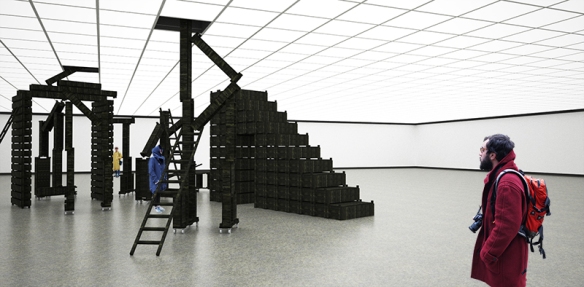Documentation of ‘Hinterland’ in Post-Peace Exhibition at Wuttembergischen Kunstverein Stuttgart.
Tag Archives: Europe
‘Hinterland’ in Post-Peace Exhibition at Wuttembergischen Kunstverein Stuttgart
Image
‘Hinterland’ installation in Post-Peace exhibition at Wuttembergischen Kunstverein Stuttgart

‘Hinterland’ after ‘Stage for Tragedy’ installation sketch

Alexandra Exter Stage for Tragedy drawing 1924
‘Hinterland’* after ‘Stage for Tragedy’ (interpretation of Alexandra Exter’s drawing for a stage setting for a tragedy in 1924) at Post-Peace** exhibition at Wuttembergischen-Kunstvereins from 24th Feb. (opening) to 7th May 2017.
24th February: Ongoing performance ‘I Must Seek Refuge Again‘
26th February: Ammunition boxing*** Performative talk (Schlossplaz and Stuttgart Central Station) starts at Schlossplaz with quatrains by 11th century Persian poet Baba Tahir and reading of The Schuman Declaration (from 9 May, 1950), Ammunition boxing will round up with The Laments of the Anonymous Stateless Immigrants — the story of ‘Consumer’s Control’, a post-artistic anti-fascist performance by Ehsan Fardjadniya at Stuttgart train station.
*Hinterland is a place between two lands
it isn’t the mainland, it isn’t my motherland
They say it is a port of fabrication, with no shine in its sand
you should leave from it, as far as you can
‘So Far, So Good: Contemporary Fascism, Weak Resistance, and Postartistic Practices in Today’s Poland’ A.S.I. Collective
Image
‘So Far, So Good: Contemporary Fascism, Weak Resistance, and Postartistic Practices in Today’s Poland’ an article in e-flux by Ewa Majewska and Kuba Szreder. In this article A.S.I. ‘s latest performance, A Funeral March to Frontex from Warsaw Uprising Museum, as the second scene of Polacy! Refugees and Citizens, is mentioned:
Similar ideas guided the artists and activists who organized the collective performance Polacy! Refugees and Citizens, an intervention staged in August 2016 at the Museum of the Warsaw Uprising and outside the Warsaw headquarters of Frontex, the EU border agency.17 When planning the action, artists Dorian Batycka and Ehsan Fardjadniya had proposed a performative historical montage that would remix the fraught memory of the Warsaw Uprising—the ultimate fight against a fascist occupier—with the current plight of refugees. The performative intervention in the museum consisted of a nonviolent reenactment of PTSD symptoms (fainting, screams, repetitive body movements) and the secret placement of adétourned pamphlet about the Warsaw Uprising. Afterward, participants marched to the nearby Frontex headquarters while carrying a small coffin and singing a Kaddish song.
During the action Ehsan, who was born in Iran, was “arrested” by the private security personnel who guard the skyscraper that Frontex calls home. No surprise there—he was the only one of us with a dark complexion. Later, real policemen arrived and briefly detained Ehsan, until they verified his Dutch citizenship and released him. In the meantime, several lawyers on hand informed us that under an “antiterrorist” law passed in January 2016, any person deemed by the police to be a potential “risk to our country” can be held without charges for up to two weeks. (Certainly, a person of Iranian descent is considered such a threat by default.) Poland is not a safe country for people of Arab and Persian descent, with the government’s racist statements echoed by football fans, neo-Nazis, and ordinary “patriots”—or even sometimes by our neighbors and fellow academics. It seems that only art spaces, whether state-run or private, remain free of these influences.
Read the full article: http://www.e-flux.com/journal/76/71467/so-far-so-good-contemporary-fascism-weak-resistance-and-postartistic-practices-in-today-s-poland/
Article in THE SEEN, Chicago’s International online journal, on Anonymous Stateless Immigrants Collective and intervention in Museum of Warsaw Uprising and Frontex
Image
Thanks to Vanessa Gravenor‘s article in THE SEEN, Chicago’s International online journal of contemporary and modern art, on our collective (Anonymous Stateless Immigrants Collective) and performance/intervention in Museum of Warsaw Uprising and Frontex: ‘It’s about a society in free fall… Frontex acts as a type of Donald Trump border policing, but in liquid form. Further interventions of ASI Collective included carrying a casket outside of Frontex’s headquarters in Warsaw, and singing a Jewish mourning song. Frontex’s is the EU’s border control that goes as far as “rescuing” refugees crossing the sea, but then always taking the refugees back to their war torn countries.’
Link to the article: http://theseenjournal.org/art-seen-international/anonymous-stateless-immigrants-collective/
With: Ehsan Fardjadniya, Dorian Batycka, Edka Jarzab, Damian Cholewinski, Aleka Polis, Lukasz Wojcicki and Sebastian Cichocki.

Statement to police on our intervention in Warsaw Uprising Museum & Frontex
We got invites to go to Komenda policji (police office) on 4th of October, all 5 Polish participants of the actions. Ehsan Fardjadniya and Dorian Batycka were not invited, and it’s highly unlikely they will be.
In the text below, we like to make our artists statement public in regards to our intervention in Warsaw Uprising Museum and Frontex headquarter in Warsaw.
For English please scroll down Continue reading
Factual Report of Our Performance and Intervention at Warsaw Uprising Museum and Frontex Office
The PDF below is a factural Report of Our Performance and Intervention at Warsaw Uprising Musuem and Frontex Office.
On August 3rd, 2016 our performance took place at around 14:00 hours in the Warsaw Uprising Museum, Grzybowska 79, Wola district, Warsaw, Poland and moved to Frontex headquarters.
This document is written by Ehsan Fardjadniya, a member of performance group who was atained at frontex office behind close door by security guards.










